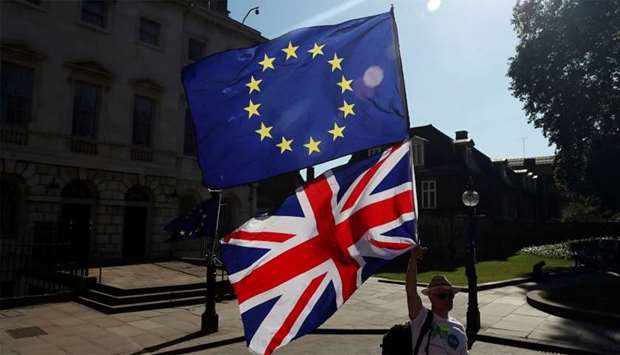British Prime Minister Theresa May faces a knife-edge vote in parliament Tuesday on her centrepiece Brexit legislation, despite her last-minute warning that defeat risks undermining her negotiations with Brussels.
MPs in the lower House of Commons will vote on a raft of amendments produced by the upper House of Lords, including one at around 1500 GMT that would give parliament an effective veto over Brexit.
Just hours before the vote, the pressure on May cranked up when a pro-EU junior minister quit the government so he could back the veto proposal.
Philip Lee said a choice between ‘bad and worse’ options was not giving MPs a meaningful vote.
Other flashpoints in the parliamentary votes include proposals to keep Britain tightly aligned with the EU's economy.
May has said a government defeat would weaken its hand in exit talks with the EU.
‘We must think about the message parliament will send to the European Union this week,’ May told MPs in her centre-right Conservative Party late Monday.
The front pages of Leave-backing British newspapers said accepting the amendments would betray the 52 percent who backed Brexit in the seismic 2016 referendum.
The Daily Express featured the British flag as its front page with the headline: ‘Ignore the will of the people at your peril.’
‘The time has come for our elected representatives to decide -- are you or are you not the servants of the people?’
The Sun had a front page of British icons including Stonehenge, a fish and chip shop, a London bus and a football, saying ‘Great Britain or Great Betrayal.’
‘Remainer MPs have a simple choice: trust the people of Great Britain... or trigger a shameful betrayal.’
May's minority Conservative government relies on the support of Northern Ireland's Democratic Unionist Party for a slender working majority in the 650-member Commons.
‘I am trying to negotiate the best deal for Britain. I am confident I can get a deal that allows us to strike our own trade deals while having a border with the EU which is as frictionless as possible,’ she said.
‘But if the Lords amendments are allowed to stand, that negotiating position will be undermined.’
- 'No deal' scenario -
The EU (Withdrawal) Bill is the draft law that would set the legal framework for Brexit and May is worried about the prospect of a rebellion by pro-EU Conservative MPs keen to retain the changes.
Some europhile Conservatives were reported to be backing away, worried that if May was fatally damaged by defeat, it could open the way for a hardline Brexiteer to take over the party and thereby the premiership.
Attention has focused on Tuesday on the so-called ‘meaningful vote’ amendment, which would give parliament the power to decide what to do if it rejects the final Brexit deal.
Lee resigned from the Ministry of Justice to back the amendment, saying parliament should be able to direct the government to change course.
‘I cannot support the government's decision to oppose this amendment because doing so breaches such fundamental principles of human rights and parliamentary sovereignty,’ he said.
‘A vote between bad and worse is not a meaningful vote.’
Former attorney general Dominic Grieve, a leading pro-EU rebel, has put down a compromise amendment on the meaningful vote, calling for a binding motion to be passed by the Commons setting out how to proceed in the event of a ‘no deal’ Brexit.
‘A meaningful vote is not the ability to reverse the decision of the referendum,’ Brexit Secretary David Davis told BBC radio.
‘The end of March 2019, we leave the EU -- full stop.’
On Wednesday, one amendment on joining the European Economic Area -- the single market -- will likely fall because the main opposition Labour Party is against it.
‘Labour will only vote for a final Brexit deal if it delivers a strong relationship with the single market based on full tariff-free access and ensures no loss of rights and standards,’ Labour leader Jeremy Corbyn said on Facebook.

